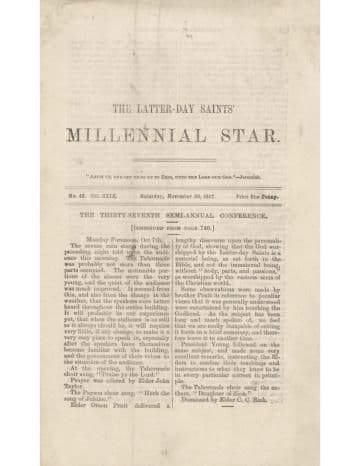Magazine
Sketches from the Book of Mormon: The Seven Prophets of the House of Jacob

Title
Sketches from the Book of Mormon: The Seven Prophets of the House of Jacob
Magazine
The Latter Day Saints' Millennial Star
Publication Type
Magazine Article
Year of Publication
1867
Authors
Maeser, Karl G. (Primary)
Pagination
759–760
Date Published
30 November 1867
Volume
29
Issue Number
48
Abstract
This article is a brief discussion of the seven prophets after Jacob and before King Benjamin. Maeser also summarizes the events that these prophets recorded.
SKETCHES FROM THE BOOK OF MORMON.
BY ELDER KARL G. MAESER.
THE SEVEN PROPHETS OF THE HOUSE OF JACOB.
Seldom has it been the good fortune of a Prophet, in the whole history of the kingdom of God, that the keys of the High Priesthood have been retained in his house for several succeeding generations; in a majority of cases, almost Amounting to a rule, we behold the mantle of the father falling upon another man instead of upon the son as we see the same principle verified in the instance of Joseph Smith, the great Prophet of this last dispensation. Not that the offsprings of those wise men had all been Hophnis and Phinehases, but that the Lord dispenses his gifts and callings according to principles, of which we scarcely have begun to understand the hint letters of the alphabet.
Whatever great and glorious things have been said of Jacob, the Prophet, the monument which his son has erected for him surpasses in beauty and grandeur the proudest mausoleum of a king; “I know that my father was a righteous for ho instructed me in his language, and also in the knowledge and fear of the Lord.” With this testimony his son Enos commences his own record testifying thereby besides his filial gratitude, his sincere appreciation of a good education, which was to him in itself already a sufficient evidence of the righteousness of his father. May all sons in Israel be able to bear a like testimony on their father’s grave, as Enos did on Jacob's.
Although the son and successor of a Prophet, having been brought up in the ways of God, and having no doubt, complied long ago with all the known requirements of the gospel, he nevertheless seeks, in repentant and humble prayer, that union with his Creator, without which no mortal can walk in safety and fulfil his destiny upon the earth. He is the first who has put on record the future destruction of the whole Nephite nation, and the final bringing forth of the plates again by the power of God as a testimony to future generations.
The notices which Jarom, Omni, Amarom, Chemish, and Abinadom, have left, give us, notwithstanding their, in some instances, self-accusing brevity, an idea of the turbulent times the Nephites had with their enemies, and also that many Prophets among the people endeavored to preserve them in the fear of God, and enforce, rigorously, his commandments.
But Amalecki, the son of Abinadom, is somewhat more explicit, although even he manifests, by his writings, that the old fire of Nephi, Jacob, and Enos, had gone down within him; but still we are indebted to him for his record, inasmuch as it gives us an account of a great change that took place in his time, with that portion of the Nephite nation that wished to be led by the Priesthood. It appears that a certain Prophet among the people, by the name of Mosiah, fled in compliance with a revelation, with all who wanted to render obedience to the voice of God, and discovered another people also dating their origin from forefathers, that had left Jerusalem at the time their own ancestors did, and guided by the hand of Providence in a similar way, had settled down on the western continent, calling their new home Zarahemla.
Mosiah, having been elected by the now united nations as their common king, not only taught the new discovered people his own language, and made a written record of their, hitherto, only traditional history, but also translated, by the power of God, the engravings upon a rock which related to a certain Coriantumr, who had lived for some time among the people of Zarahemla, and was a remnant of a third nation descending from parents who emigrated to this continent after the destruction of the Tower of Babel. The Lamanites must soon have found out the tracks of their hereditary enemies, for we see them again engaged in fighting the house of Nephi in his new home, although with rather poor success.
As it always has been and ever will be, discontented individuals and ambitious spirits wanted to strike out on their own account, contrary to the will of the Lord and his servants; thus we see at the end of Amalecki’s record, at two different times, expeditions starting northward to their former homes, but the end of both was the usual one.
Towards the evening of his life, Amalecki hands over the plates to king Benjamin, and the light of the house of Jacob, which had been constantly going down for a generation or two, only once brightening up again at the end, goes down forever in Amalecki, the last of the seven Prophets of the house of Jacob.
Subject Keywords
Bibliographic Citation
Terms of use
Items in the BMC Archive are made publicly available for non-commercial, private use. Inclusion within the BMC Archive does not imply endorsement. Items do not represent the official views of The Church of Jesus Christ of Latter-day Saints or of Book of Mormon Central.